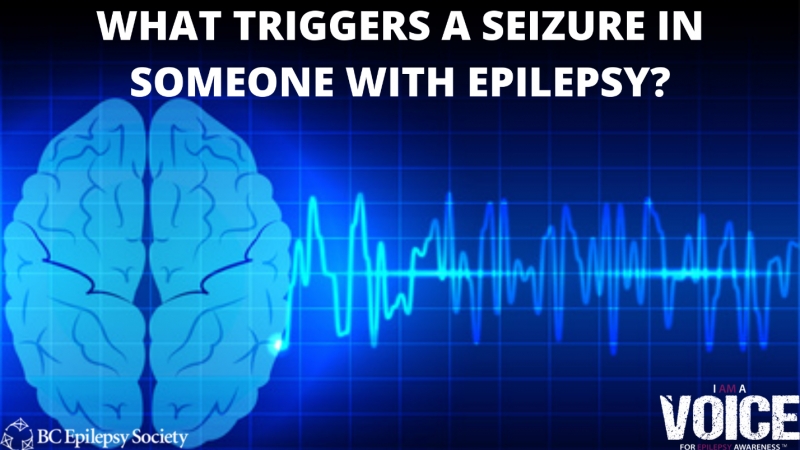What Triggers a Seizure in Someone with Epilepsy?

A trigger is something that could potentially induce a seizure in someone with epilepsy.
Because epilepsy affects everyone that has it in different ways, what triggers a seizure in one person with epilepsy may not trigger a seizure in another person with epilepsy. Also, some people may experience no triggers for their seizures.
Please see below to find out more about several common and well-known triggers for seizures:
- Missed Medication:
- Missing a dose of epilepsy medication is one of the most common seizure triggers
- Missed medication is how people with uncontrolled seizures experience more seizures than usual, more intense seizures than usual, status epilepticus, etc. and how people with controlled seizures experience breakthrough seizures
- Check out a BC Epilepsy Society resource on Anti-Epileptic Medications for more information
- Lack of Sleep:
- Sleep deprivation is one of the most common seizure triggers
- Getting a good night’s sleep is important for everyone as lack of sleep can take a physical toll on the body but especially for people with epilepsy as it can make you more likely to have seizures
- Check out a BC Epilepsy Society resource on Seizures and Sleep for more information
- Flashing Lights:
- In people with photosensitive epilepsy, a seizure can be triggered by flashing lights
- It should be noted that only about 3-5% of people with epilepsy experience photosensitive seizures
- Check out a BC Epilepsy Society resource on Photosensitivity for more information
- Stress:
- Avoiding stress is important for everyone as increased stress can take a physical toll on the body but especially for people with epilepsy because it may also bring on seizures
- Check out a BC Epilepsy Society resource on Stress Management for more information
- Illness or Fever:
- A fever could induce a seizure, which is known as a “febrile seizure”
- Additionally, being ill may induce a seizure due to fever, the physical stress of being ill, a lack of sleep due to being ill, and dehydration due to vomiting or not eating/drinking properly
- Hormonal Changes:
- Some women with epilepsy may experience increased seizures around the time of their period due to the hormonal changes that occur during the menstrual cycle
- There also may be some interactions between hormone-based contraception and epilepsy medication and vice versa
- Check out BC Epilepsy Society resources on Hormones and Epilepsy in Women, on Special Concerns about Seizure Medication for Women, and on Epilepsy and Contraception for more information
- Drug Interactions:
- Some medications may lower the threshold of epilepsy medications
- It is important to discuss all medications you are taking with your neurologist so that any interactions with epilepsy medications can be determined
- Alcohol and/or Drug Use:
- Alcohol and drugs can result in more frequent or severe seizures in people with epilepsy and first-time seizures in people who do not have a diagnosis of epilepsy
- Alcohol and drugs may also have interactions with medications, rendering them less effective or producing harmful side effects and can also cause a person to neglect taking their medication
- Check out our resource on Alcohol and Drugs for more information
- Hyperventilation, Dehydration and Overheating:
- Hyperventilation may increase abnormal brain activity which could potentially provoke a seizure in a person with epilepsy
- Dehydration (when a person with epilepsy sweats and has not replenished their hydration levels) could induce a seizure due to the drop in sodium/glucose levels in the body and the potential for medication to be excreted from the body via perspiration
- Overheating can run the risk of triggering a seizure with the same mechanisms as fever or “febrile seizures”
- Low Blood Sugar Levels:
- Substantial changes in blood sugar may trigger a seizure in people with or without epilepsy
- This can be seen with either low blood sugar (hypoglycemia) or high blood sugar (hyperglycemia)
For more information on the above, check out a BC Epilepsy Society resource on the subject here. Additionally, if you are a person with epilepsy who has known triggers for your seizures, it is important to make note of what that trigger is and try your hardest to avoid it, such as doing yoga to reduce stress or ensuring you are getting enough sleep.





